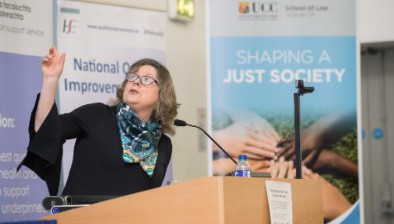Emma Slattery BL: Seanad amendments improve new capacity law

Emma Slattery BL
Emma Slattery BL explores the changes made to the new Assisted Decision-Making (Capacity) (Amendment) Act 2022 as it made its way through the Seanad.
The Assisted Decision-Making (Capacity) (Amendment) Act 2022 (Act No. 46 of 2022) was signed into law by the President on Saturday, 17th December 2022.
The proposed changes to the Assisted Decision-Making (Capacity) Act 2015 have been well documented. However, during the legislative process the Seanad introduced a number of important amendments. These were put before the Dáil on the 14th December 2022.
While many of the changes to, what is now the 2022 Amendment Act, emanating from the Seanad Stage are technical in nature, some are more substantive and warrant further consideration.
This article highlights five of the key changes to the 2022 Amendment Act, introduced during the Seanad Stages.
1. Court reporting of proceedings is to be permitted
The 2015 Act provided that hearings under Part 5 were to be heard and determined otherwise than in public i.e. in camera. This would have covered all proceedings relating to declarations as to capacity, appointment of Decision-Making Representatives and complaints against Decision-Making Representatives, among other matters.
As a result of the Seanad amendments, the 2022 Amendment Act has introduced the right for any barrister, solicitor or person specified in regulations laid by the Minster, to report on the proceedings, provided that the report or decision does not contain any information that would enable the parties to the proceedings or any person to whom the proceedings relate to be identified.
Interestingly, this amendment will mean proceedings arising out of complaints against Decision-Making Representatives can be reported on, but the identities must be protected, whereas complaints against Decision-Making Assistants and Co-Decision Makers will not have the same benefit of anonymity.
2. The Director can review or investigate a complaint
Under the 2015 Act when a complaint is made to the Director of the Decision Support Service (DSS), she was required to undertake an investigation into the complaint.
As originally proposed, a change has been introduced in the 2022 Amendment Act to allow the Director to resolve complaints informally, by issuing guidance for example.
The amendments from the Seanad to the 2022 Amendment Act introduce the option for the Director to review a complaint or investigate a complaint as she considers appropriate.
In the final Stage in the Dáil the Minister stated that this amendment was necessary to “limit the burden on the service user and the DSS”. This amendment will allow the Director to form a view on a complaint from a review of same, without the need for a full investigation, which may have involved the cost of General or Special Visitors.
It is expected that this will be utilised in situations where a complaint is particularly comprehensive and presented with all the necessary supporting evidence such that the Director can form a view on the complaint without the need for an investigation. Similarly, it is expected that it may be utilised where a complaint is submitted that is considered to be frivolous, vexatious or manifestly unfounded, such that an investigation would be a futile waste of resources.
3. Extension of the list of those entitled to bring an application pursuant to section 37 (declarations as to capacity) without obtaining advance leave of the Court
Section 36 of the 2015 Act provides that prior to making an application to court under Part 5, the applicant must obtain the consent of the court to the making of the application. However, the section goes on to provide a list of persons who are not required to obtain leave. This list was lengthy in the 2015 Act and the 2022 Bill originally proposed to add references to a cohabitant and child of the relevant person who has attained the age of eighteen years.
As a result of the Seanad amendments, the 2022 Amendment Act has added an additional section, being someone over the age of eighteen years, who has a bona fide interest in the welfare of the relevant person, as may be prescribed by regulations laid by the Minister.
Perhaps sensibly this allows for the Minister to add to the list, should it become apparent in practice that there are omissions from the list, without the necessity for amendments to the legislation.
4. Capping of fees payable to Decision-Making Representatives
Under the 2015 Act a Decision-Making Representative (DMR) is entitled to have his/her fair and reasonable expenses incurred in the performance of his/her duties paid out of the estate of the relevant person. Where the DMR is a professional, most likely appointed as a result of nomination from the DMR panel held by the Director, they are entitled to reasonable remuneration.
The 2022 Bill introduced some significant amendments to the fees payable to DMRs appointed from the Panel maintained by the Director. It provides that either where the court directs or the estate of the relevant person is insufficient to pay the DMR, then the Director can pay the DMR’s expenses, subject to regulations to be laid by the Minister.
As a result of the Seanad amendments, the 2022 Amendment Act provides that the fair and reasonable expenses paid to DMRs must be either approved by the Director of the DSS or provided for by way of regulations made by the Minster. In addition, the fair and reasonable expenses or remuneration, as the case may be, are to be calculated in accordance with a methodology, subject to limits and conditions to be made by the Minster. The regulations are also to provide for the circumstances in which the Director may authorise payments in excess of the prescribed limits.
5. Applications for wardship which are in being prior to the commencement of the act will continue
The Seanad amendments provide for an amendment to section 56 of the 2015 Act to ensure that section 7(2) of the Lunacy Regulation (Ireland) Act 1871 shall remain in force for the purpose of any wardship proceedings in being prior to the commencement of the 2015 Act. However, the court may at the same time make an Order under s.55(1) i.e. that a person either lacks capacity unless they have a co-decision maker (CDM), or that they lack capacity even with a CDM.
Thus, effectively in the same Order pursuant to the wardship application, one may be both made a ward of court and discharged from wardship into the assisted decision-making framework. In such situations, practitioners will need to be prepared for the application of the “discharge from wardship” process under the 2015 Act quite quickly to ensure that the section 8 guiding principles are adhered to.
Overall, the amendments made to what is now the 2022 Amendment Act from the Seanad are positive and demonstrate the value of our legislative process. However, it remains to be seen when the Acts will be commenced, with “early 2023” being the latest indication.
Further information on the progress of the 2022 Amendment Act through the legislative process can be found on the Oireachtas website.
- Emma Slattery BL is a barrister in practise since 2013 and author of the Assisted Decision-Making Handbook due for publication by Bloomsbury Professional in 2023.










